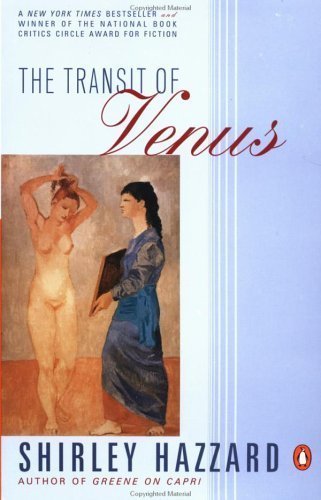In this moment of the extremely limited attention span, we can give in and confine our reading to the brief and the obvious, or we can enter into the kind of fictional world that makes the immediate fade for hours at a time—the literary equivalent of choosing a Meryl Streep movie over a twenty-second YouTube video of a kitten playing with a piece of string.
Shirley Hazzard’s extraordinary The Transit of Venus creates such a world. In the tradition of novels going back at least as far as Jane Austen, it’s the story of two sisters and the divergent paths they take in matters of love, self-definition and security. Australians orphaned before the Second World War, Caroline and Grace Bell travel with their comically self-martyring half-sister to England, where they encounter the men who will define, limit, and enlarge their lives, sometimes all at once.
A description like this runs the risk of making an exquisitely nuanced and intricate novel sound like light beach reading. The Transit of Venus, which won the 1980 National Book Critics Circle Award for fiction, is anything but, not only because it goes so deeply into matters of great moral significance but also because it is written in prose that is astonishingly elegant and precise. Hazzard is a master of the densely packed sentence, as in these description of minor characters: “She did not choose to have many thoughts her husband could not divine, for fear she might come to despise him.” A man is “insulated in the nonconducting vainglory of his days.” There is no way to read this book quickly; it’s as skim-proof as it is quotable.
So I’ll quote a little more. Grace, the quieter and more docile of the sisters, marries a stuffy, self-satisfied government official and reaches middle age without knowing the pain of impossible love. When it finally comes, directed at her son’s doctor, “the very abundance of her feelings sufficed for mutuality.”
Caro, the older, is loved by an astronomer whose affections she can’t return, seduced by an engaged and then married playwright whose questionable integrity can’t vanquish her need for him, and finally marries an American diplomat who is alarmed when their new life together isn’t immediately vibrant. Of this Hazzard writes, “The house was hushed with her stillness, which was not languor but renewal. . . . He need only wait and she would give him perfect happiness. It was for this her energies were gathering.”
The characters’ names—Sefton Thrale, Tertia Drage, Adam Vail—call to mind Henry James, whose acute observations are echoed in Hazzard and then modernized by something like the kind of sexual frankness we read in Alice Munro. It’s a novel about people whose lives bend and sometimes break, opening with one of literature’s most intense rainstorms and closing with a calamity of another kind.
When Grace’s love for the doctor threatens to capsize her tranquil life, it occurs to her that reading books might help, if only she could enter into “a state of receptiveness in which another’s torment might reach into her own soul.”
For readers of this novel, the torment of others is palpable—even, paradoxically, exhilarating. So too is their joy, intelligence, even their fallibility. It’s a glorious, unforgettable book.




